There are garden greens that are good for both goats & chickens. But some garden greens are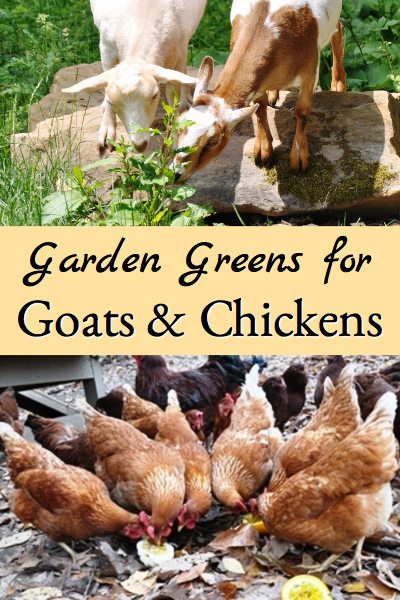
This list identifies common garden plants that are safe for goats or chickens, those that are safe if used with caution, and those plants that should not be fed to them.
Of course, by knowing what excess you can safely feed from the garden, you can cut down on the feed bill a bit. Or, you can plant extra in the garden just for the goats and chickens!
The list is organized by plant family because plants within the same family tend to have similar characteristics that make them suitable (or unsuitable) for livestock consumption. So, even if a particular plant is not listed, if you can identify the plant family it’s from, you can get a general idea about whether to consider feeding it to your goats or chickens.
It’s never a good idea to change the diet of any livestock suddenly, so any of these plants should be introduced into the goat and chicken diets a little bit at a time. Goats can be particularly susceptible to sudden changes (see Feeding Nigerian Dwarf dairy goats) so introduce new plants slowly and observe carefully.
Good Garden Greens for Goats & Chickens:
Cucurbitaceae Family
- pumpkins
- squash
- zucchini
- cucumbers
- melons
These vegetables are all great sources of nutrition for the herd or flock and are also considered to be natural dewormers. We always grow too many pumpkins and winter squash, but they can be stored and fed through the winter!
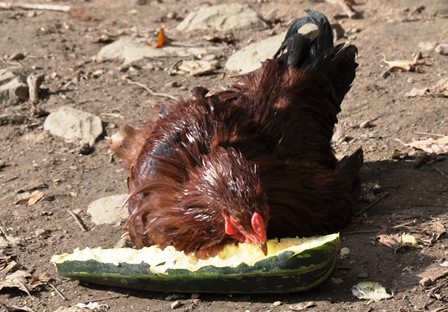
Goats & Chickens Love Squash
Leguminosae Family
- beans
- peas, see (Growing Sugar Snap Peas)
Fresh green beans (avoid uncooked dried beans) and peas as well as the plants themselves make a nutritious, high protein treat for goats and chickens.
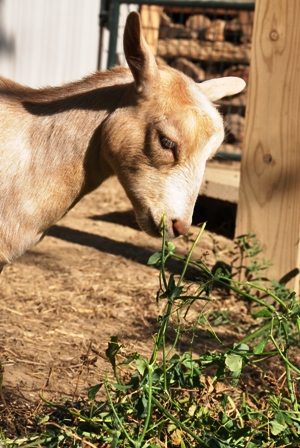
Tinker Bell Eating Peas & Pea Vines
Gramineae Family
- corn
Corn is the original food used for chicken scratch and is often already present in commercial goat and chicken feeds. It’s best fed in moderation because it’s low in protein and nutritional value as well as high in carbohydrates. The entire plant is edible but care should be taken when feeding the stalks and leaves, too much can cause problems in both chicken crops (stringy leaves can cause impacted crop) and goat rumens.
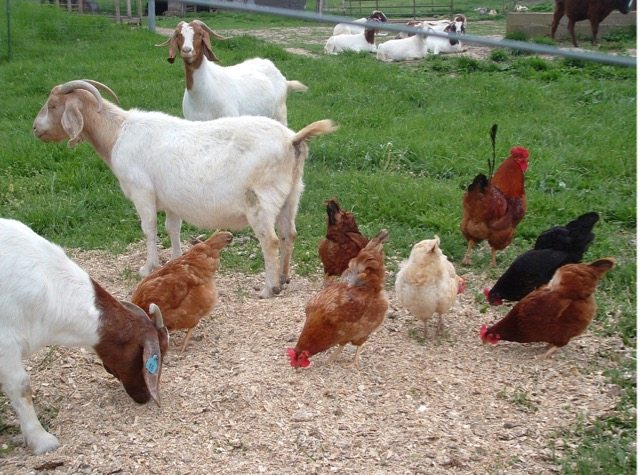
Image ©Mojeji Ranch
Compositae Family
- lettuce
- Jerusalem artichokes
- sunflowers
All of these plants make great additions to their diets and sunflowers can be dried to feed during the winter.
Umbelliferae Family
- carrots
- celery
- fennel
- parsnips
Chickens and goats tend to love the plants from this family which also includes herbs like dill and parsley. Both the tops and roots can be fed and are good for them.
Garden Greens That “May Be” Good for Goats & Chickens:
Brassicaceae Family
- broccoli
- Brussell sprouts
- cabbage
- cauliflower
- kale
- turnips
The mature plants from this family are generally considered safe for livestock; however, these plants contain glucosinolates, which can be toxic to livestock. The toxins are found in the greatest amounts in the seeds and young plants of these vegetables, so avoid them and feed only small quantities of the mature plants.
Chenopodiaceae Family
- beets
- mangel beets (see Growing Mangel Beets for Chickens)
- spinach
- swiss chard
Beet, spinach, and swiss chard greens all contain oxalic acid which binds with calcium and can cause calcium deficiency. So, the greens from these plants should be used sparingly. Beet and mangel beet roots; conversely, are very nutritious and have been used as livestock fodder for centuries.
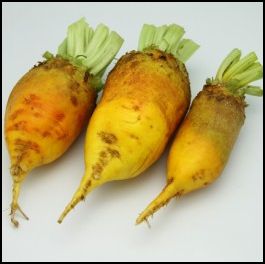
Mangel Beets Grown for Livestock
Garden Greens To Avoid for Goats & Chickens
Amaryllidaceae Family
- onions
Onions contain a substance called thiosulphate, which can cause anemia in livestock. Onions can also negatively impact the flavor of both chicken eggs and goat milk.
Polygonaceae Family
- rhubarb
Rhubarb also contains high levels of oxalic acid (see the Chenopodiaceae family above) and should be avoided. Rhubarb leaves are considered to be highly toxic to goats, chickens, and humans.
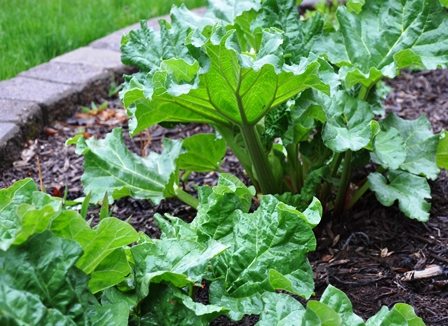
Rhubarb – Avoid Feeding to Goats & Chickens
Solonaceae Family (also known as nightshade family)
- eggplants
- peppers
- potatoes
- tomatoes
The vegetables from this family contain solanine which is considered toxic to chickens and goats. It’s best to avoid feeding the members of this family altogether.
Rachel says
But exactly HOW should I feed these foods to the hens? Such as tops and tails from when I make a salad… keep the food in an original state, eg melon on the rind, or just whole celery stalks? Lettuce leaves just strewn about? Wouldn’t that also entangle in their crops? Thank you for this information, helps me feel much more confident about feeding kitchen food to my hens!
Lesa says
Hi Rachel, You can generally feed the food in its original form; however, you may want to cut things (like celery or carrots) into pieces about an !’ long. Softer things like melons and zucnhini just give the rinds and all, It’s only tough and stringy things like corn leaves that you should avoid feeding because of the chance of impacted crop.
Roslyn Fallows says
There is a goat, a chicken and a duck where I am living at present. I like your blog as I cn check what I cn safely fe them.
The owner doesn’t mind them having some treats!
Ros
Lesa says
That’s great Ros, I’m sure they appreciate the treats!